Related Research Articles

Taiwan, officially known as the Republic of China (ROC), is governed in a framework of a representative democratic republic under a five-power system first envisioned by Sun Yat-sen in 1906, whereby under the constitutional amendments, the President is head of state and the Premier is head of government, and of a multi-party system. Executive power is exercised by the Executive Yuan. Legislative power is vested primarily in the Legislative Yuan. The judiciary is independent of the executive and the legislature. In addition, the Examination Yuan is in charge of validating the qualification of civil servants, and the Control Yuan inspects, reviews, and audits the policies and operations of the government. The party system is currently dominated by two major parties: the Kuomintang (KMT), which broadly favors closer links to mainland China, and the Democratic Progressive Party (DPP), which broadly favors status quo and sovereignty.
Strategic voting, also called tactical voting, sophisticated voting or insincere voting, occurs in voting systems when a voter votes for a candidate or party other than their sincere preference to prevent an undesirable outcome. For example, in a simple plurality election, a voter might gain a better outcome by voting for a less preferred but more generally popular candidate.
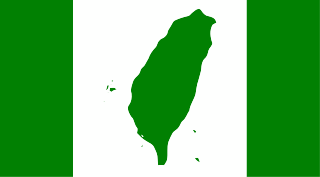
The Taiwan independence movement is a political movement which advocates the formal declaration of an independent and sovereign Taiwanese state, as opposed to Chinese unification or the status quo in Cross-Strait relations.

Chen Shui-bian is a Taiwanese former politician and lawyer who served as the president of the Republic of China (Taiwan) from 2000 to 2008. Chen was the first president from the Democratic Progressive Party (DPP) which ended the Kuomintang's (KMT) 55 years of continuous rule in Taiwan. He is colloquially referred to as A-Bian (阿扁).
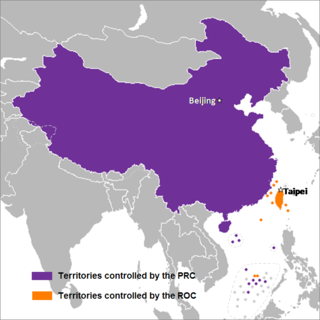
Chinese unification, also known as Cross-Strait unification or Chinese reunification, is the potential unification of territories currently controlled, or claimed, by the People's Republic of China and the Republic of China ("Taiwan") under one political entity, possibly the formation of a political union between the two republics. Together with full Taiwan independence, unification is one of the main proposals to address questions on the political status of Taiwan, which is a central focus of Cross-Strait relations.

The Taiwan Solidarity Union (TSU) is a political party in Taiwan which advocates Taiwan independence, and is affiliated with the Taiwanese localization movement. It was officially founded on 12 August 2001 and is considered part of the Pan-Green Coalition. Unlike the Democratic Progressive Party, its larger companion party in the Pan-Green Coalition, the TSU actively campaigns for the creation of a de jure Republic of Taiwan. The future of the party is in doubt after the 2016 elections as the party failed to secure enough votes to be eligible for state funding.

The Constitution of the Republic of China is the fifth and current constitution of the Republic of China (ROC), ratified by the Kuomintang during the Constituent National Assembly session on 25 December 1946, in Nanjing, and adopted on 25 December 1947. The constitution, along with its Additional Articles, remains effective in ROC-controlled territories.

Presidential elections were held in Taiwan on 20 March 2004. A consultative referendum took place on the same day regarding relations with the People's Republic of China.
A consultative referendum was held in Taiwan on 20 March 2004 to coincide with the 2004 presidential elections. Voters were asked two questions regarding the relationship between Taiwan and China, and how Taiwan should relate to China. The initiation of this referendum by President Chen Shui-bian came under intense criticism from China because it was seen as an exercise for an eventual vote on Taiwanese independence. The Pan-Blue Coalition urged a boycott, citing that the referendum was illegal and unnecessary.

The 2004 Taiwanese legislative election was held on 11 December 2004. All 225 seats of the Legislative Yuan were up for election: 168 elected by single non-transferable vote, 41 elected through party-list Proportional representation, eight elected from overseas Chinese constituencies on the basis of the proportion of nationwide votes received by participating political parties, eight elected by popular vote among the aboriginal populations. Members served three-year terms beginning on 1 February 2005, and ending 31 January 2008. The next term served four years.
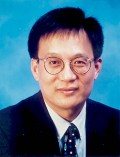
The 2004 Hong Kong Legislative Council election was held on 12 September 2004 for members of the Legislative Council of Hong Kong (LegCo). The election returned 30 members from directly elected geographical constituencies and 30 members from functional constituencies, of which 11 were unopposed.
The Hare quota is a formula used under some forms of proportional representation. In these voting systems the quota is the number of votes that guarantees a candidate, or a party in some cases, captures a seat. The Hare quota is the total number of votes divided by the number of seats to be filled. This is the simplest quota, but the Droop quota is mostly used currently.

Elections in Ukraine are held to choose the president, Verkhovna Rada (legislature), and local governments. Referendums may be held on special occasions. Ukraine has a multi-party system, with numerous parties in which often not a single party has a chance of gaining power alone, and parties must work with each other to form coalition governments.
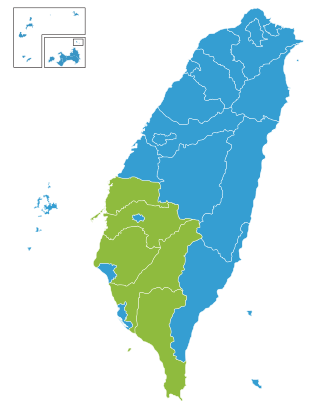
Presidential elections were held in Taiwan on 22 March 2008. Kuomintang (KMT) nominee Ma Ying-jeou won with 58% of the vote, ending eight years of Democratic Progressive Party (DPP) rule. Along with the 2008 legislative election, Ma's landslide victory brought the Kuomintang back to power in the Republic of China.

The pro-democracy camp, also known as the pan-democracy camp, is a political alignment in Hong Kong that supports increased democracy, namely the universal suffrage of the Chief Executive and the Legislative Council as given by the Basic Law under the "One Country, Two Systems" framework.

The 1998 Hong Kong Legislative Council election was held on 24 May 1998 for members of the 1st Legislative Council of Hong Kong (LegCo) since the establishment of the Hong Kong Special Administrative Region (HKSAR) in 1997. Replacing the Provisional Legislative Council (PLC) strictly controlled by the Beijing government and boycotted by the pro-democracy camp, the elections returned 20 members from directly elected geographical constituencies, 10 seats from the Election Committee constituency and 30 members from functional constituencies, of which 10 were uncontested.

The pro-Beijing camp, pro-establishment camp, pro-government camp or pro-China camp is a political alignment in Hong Kong which generally supports the policies of the Beijing central government and the Chinese Communist Party (CCP) towards Hong Kong. The term "pro-establishment camp" is regularly in use to label the broader segment of the Hong Kong political arena which has the closer relationship with the establishment, namely the governments of the People's Republic of China (PRC) and the Hong Kong Special Administrative Region (HKSAR). It is labeled the "Patriotic Front" by pro-Beijing media and "loyalists" by the rival pro-democracy camp.

The 2011 Hong Kong District Council elections were held on 6 November 2011. Elections were held to all 18 District Councils of Hong Kong, returning 412 members from directly elected constituencies, each selecting a council member. After the government's constitutional reform package was passed in 2010, five new seats in the Legislative Council would be created in which the candidates would be nominated by all District Councillors.

The 2019 Hong Kong District Council elections were held on 24 November 2019 for all 18 District Councils of Hong Kong. 452 seats from all directly elected constituencies, out of the 479 seats in total, were contested. Nearly three million people voted, equivalent to 71 per cent of registered voters, an unprecedented turnout in the electoral history of Hong Kong. The election was widely viewed as a de facto referendum on the concurrent anti-extradition protests.
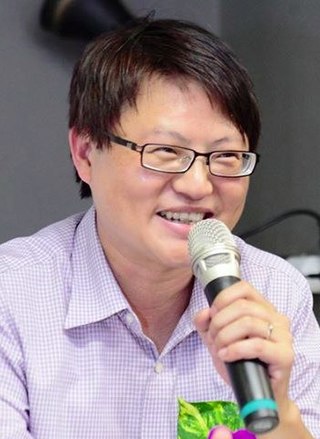
The Taiwan Statebuilding Party is a political party in Taiwan. The party was established in 2016 as Taiwan Radical Wings. The party is considered a close ally of the Democratic Progressive Party.